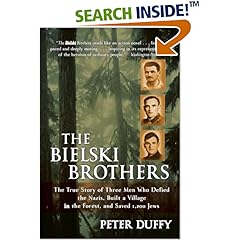I have come to a realization that the world is inherently imperfect and flawed, and the best heroes are still ultimately HUMAN. The religious desire to canonize anyone, and to make humans into saints is hence very counterproductive. I think that my grandmother's friend, who saved 1200 Jews in the Holocaust, is a true hero - someone who unfortunately has not been lionized by the history books as he should have been, but a true hero nonetheless. His name (was, he died a decade ago) Zus Bielski, and he will forever live in the history books as a great man. (and I met him!) And yet he killed whole families of Polish Nazi collaborators, as a punishment for their having caused Jewish death. They wanted to make a statement that Jewish blood does not come cheap. The Allied troops also were not wholly innocent flowers, having carpet bombed Dresden, and of course used the atomic bomb on Hiroshima and Nagasaki.
But ultimately, there is no real morality in war. We do what we can to survive. When monsters attack us, if we choose to live, we have to make choices: WHAT are we willing to do in order to live? What steps are we willing to take for our survival? And we have to inherently commit atrocities to stop atrocities. Stealing bread in order to live may seem rather justified to you and I, however, it still is violating someone's property right...
In the spectrum of good and evil, there are extremes on both sides, but ultimately, is anyone really truly good or truly evil?
The Polish government evidently does not think so. They are conducting an investigation into the Bielski Brothers, into their actions against Polish peasants. I think the evidence is in and the Bielski Brothers (who are all dead, save for Aron Bell, the youngest brother, who was 11 years old when this all happened), simply did what they had to do to survive and protect the hundreds of Jews they saved.
But, I ask you dear readers...how far should one go to save another's life? And are the truly great men the ones who can overcome their internal dissension, and do what is necessary to accomplish great things?

3 comments:
We agree on this one (for a change :-)
Also, I don't think that the bombing of Hiroshima and Nagosaki was immoral.
It saved innocent American lives. Japanese were not innocent: people carry responsibility for the people they allow to rule them.
Same goes for Dresden.
Shlemazl:
I think there was a misunderstanding, and actually we agree about the nature of modern Jewry.
We definitely agree about the morality of war. I think Hiroshima, Nagasaki, and Dresden were all justified.
One man's hero is another man's villian/enemy. I think somebody famous said that.
When it comes to war, there are no morals. The primary role of any solider is to follow orders and to kill the enemy, in order for that solider's side to win the war. Some soliders are classed as hero's, some would probably take that as an ego boost, while others would just say they were doing what they were trained to do.
As for Dresden, in hindsight it was a mistake, but at the time it was perhaps a prudent course of action or just a way for the British people to see the Germans getting what they deserved. But the Nazi's did far worse carrying out their final solution plan.
And on the issue of nuclear weapons, they are the weapons of last resort. I hope they are never used again. The nuclear attacks on Japan did what they were meant to do. But one must not forget that children were caught up in it. And they really have no choice as to what their parents follow or the actions they take, unless the child's life is in danger etc. So it's not as clear cut as it seems. That however is the nature of war. It turns us all into violent beasts, capable of horrors that only stalk us during those dark hours of sleep. While the victors claim the hero, the losers get painted with the brush of the villian.
Post a Comment